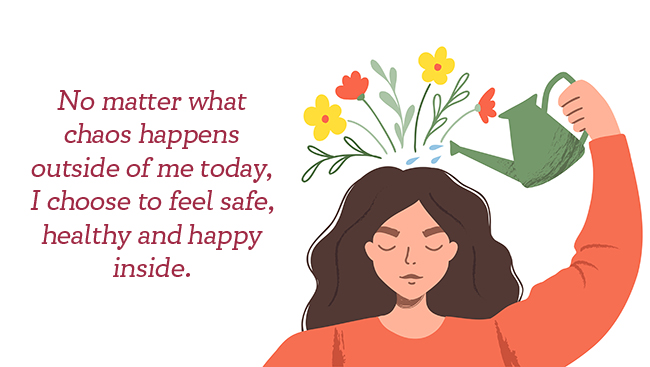One in three Canadians suffers from mental health issues currently. There is a 31% predicted increase over the next few years, and healthcare agencies are barely meeting the needs of Canadians at present. They certainly do not have the resources to deal with the tsunami of anxiety and depression in the future. Therefore, it is vital to establish good mental habits today to prevent severe anxiety and depression later. As a physician for the past 30 years, a mental health researcher and author of the bestseller The Mind-Body Cure, I can assure you that establishing good mental health habits is the key to preventing illness.
An effective morning habit that helps focus on your health is sitting quietly in the morning with your thoughts before you touch your phone. The volume of texts and emails fragment your attention and disrupt your brain. Calming the mind and observing your stream of thoughts is a conscious ability humans possess, known as metacognition. When you are in the metacognitive state, you have much better access to your consciousness or “higher self.” You suddenly realize that you are capable of thought mastery, i.e., you can control your thoughts you previously had no control over.

Only in this mindful state can you take charge of the inner dialogue and set clear intentions for your health. Research shows that harnessing the power of intent is very effective because intent informs your outcomes.
When you have declared your intentions to be mentally and physically healthy, you have created a roadmap for the choices you have to make for diet, activity and stress management. For example, you may set an intention: No matter what chaos happens outside of me today, I choose to feel safe, healthy and happy inside. We don’t have much control in this crazy, fast-paced world; you are faced with hundreds of daily decisions, with thousands of pieces of information competing for your attention span. Intention and attention are at the core of creating optimal health. This realization will set you apart from the majority of people who are distracted. Always remember that “wherever your attention goes, energy flows,” this means you have to consciously learn to focus on the important things and prioritize those tasks over anything else, especially your health.
Those who worry about what may happen in the future are often consumed by anxious thought patterns. This can manifest in your body as increased heart rate, high blood pressure, insomnia, gut problems and muscle tension. Some patients require treatment for severe anxiety disorders, which can be debilitating.
Others keep thinking about things that have happened in the past, the “rewind” button on their thought patterns focus on regret, blame, and being a victim of circumstances. This can manifest in the body as fatigue, apathy, feeling sleepy, overeating or loss of appetite. Often they get diagnosed with depression and prescribed antidepressants. While severe anxiety and depression warrant prescriptions and interventions, much of the new data looks at ways to empower patients to prevent symptoms of anxiety and depression from becoming chronic. Realizing the importance of settings intentions and managing your attention is one vital aspect of healthy habits that can empower you to take charge of your health.
Here are some easy action steps you can take today to create healthy habits for good mental and physical health in the future.
The MEDS formula stands for Mindset, Exercise, Diet, and Sleep:
MINDSET:

A healthy mindset is the cornerstone of all the choices. Cultivate a mindset of health by going deeper into what makes you tick; what thoughts are you focusing your attention on? Are your automatic thoughts and negative inner dialogue sabotaging your ability to make good choices? Change your attitude and choose better thoughts that serve you, not work against you. Practice being mindful, being grounded in the moment and present in what is in front of you. Focus your attention on the moment you have right now. Using deep, controlled breathing techniques can help to calm the mind.
EXERCISE:

People who exercise regularly live longer and are more mentally resilient. Motion is lotion, so you must move your body as much as possible for as many years as possible. Exercise burns off stress hormones and builds serotonin, the natural happy chemical in your brain. Sitting is the new smoking; working from home and sitting for prolonged periods is unhealthy. Aim for 150 min of weekly cardio and 7000-10,000 steps daily.
DIET:

Choose foods mindfully that are rich in fibre, good fats, good proteins, mostly plant-based and avoid highly processed foods. Limit excessive salt and alcohol in your diet. Take the time to taste, smell and savour your food so your digestive system can absorb all the nutrients. You cannot digest if you are constantly under stress. Remember to REST and Digest instead of Stress and distress. Many people need extra Vitamin D, omega three oils and magnesium, which can often be supplemented to your regular diet. Vegans may need extra iron or B vitamins which can be discussed with your doctor.
SLEEP:
Sleep is absolutely essential to our mental and physical health. Important hormones and chemicals which repair our body are manufactured when you are in deep, restful sleep. Day and night, people rely heavily on technology, and excessive screen time disrupts our regular sleep cycles causing changes in our hormones. Avoid screen time at least 1-2 hours before sleep. Take a soothing bath, read a book and wind down in a relaxed routine before bedtime. Practice deep breathing techniques to relax your muscles as you prepare to sleep at the same time every night. Aim to wake up at the same time every day.
These daily MEDS habits will become your automatic default options, and your mind and body will function optimally. For more such information, refer to the book:
The book is available on the following link: AmazonIndigo and at your Local Bookstore
Ted Talk link: https://youtu.be/qq0DBeFdDlM
Website: http://drbalpawa.com/

Dr. Bal Pawa is a Harvard Trained medical doctor, researcher, author and expert on evidence-based Mind-Body connection. With over 30 years of clinical practice focusing on integrative and holistic healthcare, she is passionate about empowering people to take charge of their health. Her international best-selling book, The Mind-Body Cure, is full of practical advice for self-empowerment. Her Ted talk on anxiety has nearly a million views. She is the proud co-founder of the Westcoast Women’s clinic.




